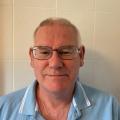WHEN John Baxter gazed skyward just before 11 am on the morning of Thursday, August 9 1945 and saw two planes heading towards Nagasaki, little did he know that over three year’s incarceration as a Japanese prisoner of war, first in Java and then on mainland Japan in the small mining village of Inatsuki in Fukuoka province, would soon cease.
His son, John Baxter Jnr, of Deverell Close, Bradford on Avon, says that 65 years later in 2010, his father published a book, Missing Believed Killed, giving an eyewitness account of the atomic bomb being dropped and his experiences as a Japanese Prisoner of War.
In 1942 corporal John Baxter, a royal engineer, was captured by the Japanese in Indonesia.
For the next three years he was held as their prisoner, during which time he was starved and beaten and contracted malaria, dysentry and diphtheria, for which he received no treatment.
At one point Mr Baxter Snr was given a 50-50 chance of surviving and moved to an isolation cell where he was kept awake at night by the sound of coffins being made for fellow prisoners who had not been so lucky.
He spent the last two years of the war working in the hard labour mines in Kyushu, from where he witnessed the dropping of the atomic bomb on Nagasaki 40 miles away and felt the scorching wind from the blast.
Remarkably, Mr Baxter Snr, who died in February 2017 just days short of his 98th birthday, survived against all the odds to return home to the UK where he was treated at Papworth Hospital for lung damage.
Mr Baxter Jnr said: “My father worked in the mine’s surface-based electrical workshop and had no idea that the first of the two atom bombs had dropped three days before on Hiroshima.
“On that morning, the air raid sirens had wailed mournfully over the village and my father was on stretcher duty alongside a Japanese soldier and near a slit trench into which those prisoners too ill to work had been herded.
“My father recalled: 'There was a massive whoomph and I thought that a petrol dump at a nearby airfield had exploded. Then I saw this massive mushroom cloud in the distance.
'The Japanese soldier jumped immediately into the trench but I had nowhere to hide and then the blast hit me, bowling me over and singeing my eyebrows and what little hair I had on my shaven head.
‘At the mineshaft, a group of POWs had just emerged and, covered in coal dust, immediately were set alight. 'However, there were puddles in the vicinity and quick-thinking colleagues managed to dowse the flames with no lasting ill effects'.
Mr Baxter Snr later described the devastation caused by the atomic bomb as: 'It was as if someone had come along with a massive scythe and taken everything away above three feet and then piled it up against a mountain wall in the background.”
Missing Believed Killed tells his remarkable story of survival, his reunion with his captor, Hirano, who was in charge of the electrical workshop, and the face-to-face apology given by the Japanese Ambassador to the UK to former POWs.
Mr Baxter Jnr said: “Unlike many POWs, my father, a true Christian, forgave the Japanese for what they did to him.
"He became the very first Japanese Pow whom the Japanese Ambassador to the UK apologised to face-to-face on behalf of the Japanese nation in a televised interview.
"We were grateful for the Japanese companies Mitsui and Toshiba and Richard Branson’s Virgin Atlantic Airways who helped fund the trip back to meet Hirano.
“In the Japanese documentary that was made back in 1995, I personally will never forget the moment when Hirano and my father walked on the pathway near to the slit trench and, as he pointed to the direction of Nagasaki, the cloud formation at that very moment formed into a mushroom cloud.
“An eerie but poignant moment and one that, on that fateful Thursday back in 1945, my father would never have thought would be seemingly repeated all those years later.
“In 2016, we visited the Hendon RAF Museum and, as we were walking around, we came across a picture taken from one of the two planes that passed overhead of the mushroom cloud.
"I managed to persuade my father to pose alongside it and, as he did, a group of English schoolchildren passed by with their teacher and overheard my father saying: 'yes it wasn’t pleasant even to be around 60 miles away when that thing went off!''
"The next half an hour provided a fascinating insight into my father’s time in Japan for around 30 enthralled children.
"A picture taken over 60 years before, and the lives lost but FEPOW's lives saved, for a brief 30 minutes somehow came to life.
"As these somewhat muted 75th anniversary celebrations of VJ Day take place this weekend, just as with the Covid- affected VE Day celebrations, it is a time to remember that Forgotten Army, which now just has a handful of remaining survivors all close to or over 100 years old.
"My father’s legacy for his children, grandchildren and great grandchildren will always be there in videos, pictures, newspaper articles and more especially his book."









Comments: Our rules
We want our comments to be a lively and valuable part of our community - a place where readers can debate and engage with the most important local issues. The ability to comment on our stories is a privilege, not a right, however, and that privilege may be withdrawn if it is abused or misused.
Please report any comments that break our rules.
Read the rules here